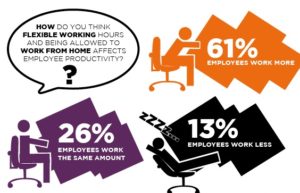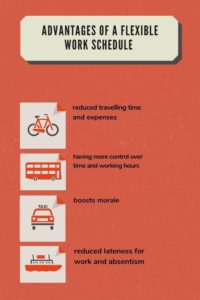
How offering a flexible working schedule for employees to benefit employers?
The flexible working schedule for employees is the new mantra for employers seeking to maximise the employees potential.
“In the right roles and with the right people, flex does offer tremendous productivity improvement. It gives people time to process properly, and it gets them out of the office in terms of being bogged down in day-to-day admin. So there is more thought leadership that comes to the table, and that’s where your creativity and innovation come in.”
— Osman Khan, Cofounder and CEO of Paddle8

The flexible working schedule for employee sare among the essential things on the wish list of many employees. Nowadays, flexible working hours are becoming crucial due to the benefits it gives to employees and employers. Greater employee productivity and higher organisation profitability are the most common benefits of flexible working hours.
- Employees get the freedom to adjust their working hours and social life.
- It also helps them to plan the time they arrive and leave the office.
- It can be easy and possible, depending on the type of work and the discipline of employees.
The flexible working schedule for employees considers as one of the best perks an employer can offer. It is a way of appreciating people’s lives outside of work and trusting them to prioritise when and where they work on projects and complete them. The versatile working schedule doesn’t only benefit employees but employers too. Dive into the blog to know the five benefits of flexible working.
“People today really value workplace flexibility and remote work because it allows them to focus their energies on work and life as opposed to commuting or other complications due to geography.”
— Ken Matos, Vice President of Research, Life Meets Work

Five hidden benefits of flexible working schedule for employees
- Attracting talent
Recruiting and retaining talented employees is a topmost priority for almost every business to reach success. But, with today’s lifestyles, more professionals are looking for more flexible options. And the younger generation isn’t tied to the idea of a physical presence being necessary to get work done. So, offering flexible working hours can attract the best candidate for your business.
- Employee productivity
There is nothing worse than holding an employee at work who doesn’t want to be there. Why? Because they are absent-minded and not being productive. By giving people the ability to be in control of their own working lives, their productivity can improve drastically.
A study shows that productivity proliferates when an employee can work remotely from anywhere they are comfortable. For those working at home, they can manage their time wisely and might start working even earlier and finish earlier.
- Reduce staff turnover
Many employees who get flexible working opportunities see this chance as a sign that the company values them. It gives room to be more efficiently even when they are working remotely. Many employees will prefer to continue working in an environment that offers them such freedom. This factor will diminish the rate of turnover.

“We need to take a more flexible approach to both the workplace and the work we do; one that provides us both the physical and cognitive space to harness the incredible power, insight and experience we offer, but focused not on the individual processes but instead on the overall outcomes our organisations are seeking to achieve.”
— David Coplin, Chief Envisioning Officer of Microsoft UK
- Increases Room for Creativity
Happy and satisfied employees are those who get the chance to work on a flexible time schedule. It proffers a room for thinking outside the box and be more innovative. Although it might not be the case for some employees, spending a long time in the same ambience can limit the creative possibilities. A change of work environment can be a catalyst for creativity to employees.
Depending on work processes, some employees get more actively involved in ongoing projects or general working culture when they reach the office at flexible times. It is the reason employers should consider the nature of work and the type of employee when arranging flexible hours.
- Supports Employees Well Being
One of the critical benefits of flexible working hours is it boosts employees’ morale and improves their physical and mental wellbeing. The wellbeing of the employees is a severe concern for many employers, and implementing flexible working schedule can secure employee wellbeing. When employees have adaptable working hours, they are likely to be less fatigued. Spending a few hours at work can also prevent burnout and stress that can be the result of toxic workplace culture.
The appropriate use of flexible working hours can benefit both employees and employers. Employers are more concerned about how millennials are adjusting to working lifestyle. For millennials, work-life balance is an essential factor when choosing their jobs.
Millennials are creative and have potentials to do better than other generations; this might be due to current advances in technology that enables more work to get done more efficiently. So, with flexible working hours, much can be accomplished by the employees who will get the chance to experience that. With this, they can work harder than ever to deliver results.
“Technology now allows people to connect anytime, anywhere, to anyone in the world, from almost any device. This is dramatically changing the way people work, facilitating 24/7 collaboration with colleagues who are dispersed across time zones, countries, and continents.”
— Michael Dell, Chairman and CEO of Dell

Reach us for Hiring the best candidates with the leading Recruitment consultancy at Hand Phone: +91 7795547089 or Email us at team@bssrecruit.com.




